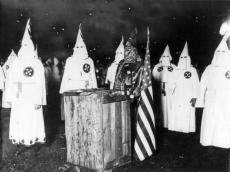Today.Az » Weird / Interesting » When the Nazis courted the KKK
19 May 2015 [10:24] - Today.Az

The classic Hollywood epic Gone With the Wind aroused a powerful surge of admiration and romanticism in audiences when it was first released in 1939. But it sent one of its biggest enthusiasts, Nazi minister of propaganda Joseph Goebbels, into a jealous rage. The German version of the picture (Vom Winde verweht) was reportedly one of Adolf Hitler’s favorite films, but, for Goebbels, it was a reminder of how far from beguiling the budding Nazi film industry was by comparison. “Goebbels,” as Life magazine reported in 1941, “would not even allow party officials to see it for fear that they might contrast it too unfavorably with the trashy but expensive films now being produced in Germany.” But Gone With the Wind was not the only thing the Nazi elite admired when it came to the American South. According to historians Johnpeter Horst Grill and Robert L. Jenkins, “the American South, with its long-established system of white supremacy, was a source of interest to the Nazis as they, too, sought to work out their own system of Aryan supremacy.” Hitler greatly admired America’s “wholesome aversion for the Negroes …”
For the Nazis, the South represented a sociopolitical structure that had successfully maintained the separation between the races for centuries. In the 1930s, Nazi publications, which were anti-black in addition to being anti-Semitic, praised the “southern way,” pointing out that many Americans were also working against “racial bastardization,” evident from, among other things, the 30 or so U.S. states that had legal restrictions on interracial marriage. Hitler himself greatly admired America’s “wholesome aversion for the Negroes and the colored races in general” and warned of German culture being “negrified.” The public execution of undesirable minorities — in the form of lynchings — was still prevalent in Southern states at the time. In fact, as Cambridge University political scientist David Runciman observes in the London Review of Books, “what happened in the South was in the early 1930s more overt and more bestial than anything taking place in Germany, where state-sanctioned murder was treated as an unpleasant necessity rather than a public festival.” While the South’s transgressions may not have risen to the level of genocide, the threat of such mass killing was ever present in its history, even after the Civil War. James K. Vardaman, elected governor of Mississippi in 1903, once proclaimed that should it become necessary to maintain white supremacy, “every Negro in the state will be lynched.” Southern America also represented for the Nazis a tangible example of a functioning one-party state. As Runciman points out, during the 1936 election, Franklin D. Roosevelt won 97 to 99 percent of the vote in heavily Democratic states like South Carolina and Mississippi — not far off the 98.8 percent of the vote the Nazi party achieved in its victory that same year. The Democrats, however, unlike the Nazis, achieved such numbers via poll taxes, threats of violence and other means designed to thwart nonwhite voter turnout. Southern unity in Congress was enough to stymie reforms, including anti-lynching legislation. For a while Nazi press and propaganda outlets zealously reached out to those they were certain were their ideological compatriots in the U.S., but they soon focused instead on the German-American community. Both overtures failed. The Nazis’ “love affair with the South,” Runciman says, “was emphatically not reciprocated.” Why? Because despite the endemic racism and widespread support for segregation in the South, Southerners thought of themselves, first and foremost, as patriots. Their martially inclined, honor-driven citizenry had eagerly signed up in droves for almost every conflict in American history, and much of the saber rattling urging Roosevelt and Washington to enter the war came from vehemently anti-Nazi Southerners. Southern newspapers also took umbrage at Hitler’s attitude toward black U.S. Olympians like Jesse Owens, some even arguing that America should boycott the 1936 Games in Berlin. And they attempted to distinguish between lynching, which was still legal, and the sort of systematized genocide being conducted by the state itself in Germany. National publications like The New York Times also tried to draw a sharper line between the U.S. and Nazi Germany, arguing in a 1936 editorial that when Americans discriminate, they “do it in the good, old, thick-headed, prejudiced, irrational human fashion.” Fortunately, good ole thick-headed, prejudiced America and its allies would prevail over Germany in the war. And both nations have since made great strides in overcoming their racist pasts, even if neither can truly claim that its shameful history represents, as the Academy Award-winning film’s title card reads, “a civilization gone with the wind.” /By Ozy/
 |
|